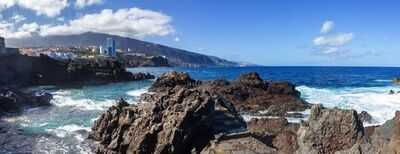
Tourists visiting Tenerife will face a new eco-tax from January 1st. The island's government is going to charge holidaymakers up to 25 euros to climb its most iconic landmark, Mount Teide. Tenerife residents will be able to visit free. There will also be strict daily capacity limits.
Mount Teide is Spain's highest peak and a UNESCO World Heritage Site and is visited by millions of people each year. However, it has become so overcrowded with blocked access roads that Tenerife's Cabildo says it has to balance tourism with conservation.
Tenerife's president Rosa Dávila and vice president Lope Afonso stressed that the initiative is designed to regulate visitor pressure, similar to the eco-tax already applied in the mountain-top village of Masca, and to ensure the long-term protection of the National Park.
Non-residents will have to pay between 10 and 25 euros, depending on the chosen day and route.
The tax applies specifically to two trails that allow access to the summit: Trail No. 7 Montaña Blanca - La Rambleta and Trail No. 10 Telesforo Bravo (leading from La Rambleta to the crater)
To prevent overcrowding, a maximum of 300 climbers per day has been set. Visitors will be distributed into three time slots, with a quota of 100 people per section and time slot.
The Cabildo estimates the eco-tax will generate around 650,000 euros annually, earmarked exclusively for the maintenance and conservation of Teide National Park.
Unauthorised ascents without prior reservation can result in fines of up to 600 euros.
According to Rosa Dávila, visitor numbers to Teide have reached an "unsustainable" level.
In 2020, around 3.5 million people visited the park.
By 2024, this number had exceeded five million, with 88% being tourists and only 11% local residents.
This surge has heightened environmental pressure on the fragile volcanic ecosystem, prompting the Cabildo to adopt new measures.
"Teide is not only a symbol of our identity but also a natural heritage that we must protect responsibly," she stressed.
The new measures aim to strike a delicate balance: ensuring visitors can continue to enjoy the majesty of Mount Teide while preserving one of the Canary Islands' most unique and vulnerable ecosystems for future generations, she added.
"It represents a courageous decision and marks the first of many guidelines that will protect our National Park, which belongs to all the people of Tenerife. We must prevent its degradation and any tool that helps preserve it will be studied."
Among the rules for those who set foot on the summit of El Teide, they must carry a printed or digital permit along with an official ID. It is essential to wear long pants, warm clothing, appropriate mountain footwear, sunscreen, energy-boosting food and water. Users must also carry a fully charged mobile phone, a thermal blanket, a flashlight or headlamp, gloves and a hat.
Reservations are required through the Tenerife ON platform.
Maximum capacity of 50 people per time slot, with specific time slots for sunrise (6:00-9:00 a.m.) and sunset (6:00-10:00 p.m.).
Additional restrictions apply to minors and people with health or mobility issues.
Failure to comply with the rules will result in administrative sanctions and, in the most serious cases, even criminal penalties. These include:
Fines of up to 600 euros for unauthorised access.
One-year suspension for guides who violate the regulations.
Temporary suspension for those who reserve and fail to use their permits without justification.
Fines of up to 600 euros for unauthorised access.
One-year suspension for guides who violate the regulations.
Temporary suspension for those who reserve and fail to use their permits without justification.
You may also like

Ladakh: Government calls Ladakhis peace-loving patriots, says dialogue process will start soon

Gardeners urged to leave two fruits on lawns and bird tables in October

Strictly's Vicky Pattison's anxiety as she issues defiant statement about 'quitting'

Jammu and Kashmir: Vaishno Devi closed for three days from today after rain forecast

This nighttime symptom may signal a chronic disease: Expert warns of silent red flags for diabetes risk you shouldn't ignore






